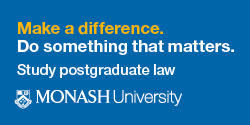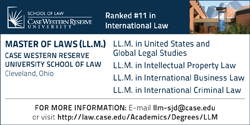Professor / Assistant Professor, Private International Law
The University of Turku is a world-class multidisciplinary research university which offers interesting challenges and a unique vantage point to national and international research and education.
The Faculty of Law is a modern research and educational community. Under the roof of Calonia takes place a well-knit academic community in which the interaction between students, teachers, researchers and administrative staff is easy and uncomplicated. The production of the new research information and the training of the new experts are core tasks of the Faculty.
The Faculty budget includes salaries for 70 people. This includes roughly 55 people in the research and teaching staff and roughly 15 people in other positions. Each year, 140-192 students majoring in Law begin their studies at the Faculty. There are 1300 students al-together studying in the Faculty.
The Faculty of Law is not divided into departments or subjects. Instead, the research and teaching carried out at the Faculty cover all branches of law extensively. The main research fields of the Faculty include constitutionalism and fundamental rights as well as legal research on economic changes. Research at the Faculty is not divided into these two main fields by subject. Rather, different subjects conduct research in both areas. This allows researchers to develop contacts both within the Faculty and with external stakeholders.
For the post of Professor, a researcher of high international standard is needed. For the tenure track Assistant Professorship, we seek a talented and already merited researcher at the beginning of his/her academic career and who has shown potential in research. The focus of teaching is on Private International Law and Family Law. More detailed content of the post are defined later according to the merits and suitability of the appointed person.
The post will be filled directly as a permanent position of Professor or through a tenure track system first as fixed-term employment periods as Assistant Professor. The aim of advancing on the tenure track is the qualification into tenure of a professorship, which requires success in evaluations. The tenure track system of the University of Turku is clarified in more detail at the end of this announcement.
The duties of the Professor include conducting and supervising scientific research, teaching, staying up-to-date with the most current scientific developments in his or her field and participating in societal interaction and international cooperation in his or her field.
The duties of the Assistant Professor are to carry out and supervise scholarly work, to provide education based on it and to follow academic developments, as well as to participate in societal interaction and international cooperation in his or her field.
The salary for the post is determined in accordance with the university salary system for teaching and research personnel. The task specific salary component for the Assistant Professor is 3.819,56 euro per month (according to level 7 of the job demands chart). For Professor, the salary is at levels 8–10 on the job demands chart, where the task specific salary component is between 4.617,75 and 5.885,99 euro per month. In addition to both, there is a component based on personal performance, which is at most 46,3 % of the position-specific salary. The salary for this particular post is determined when drawing up the employment contract.
Formal qualifications
The requirements for a position of Professor include a doctoral degree, high-level scientific competence, experience in managing scientific research, experience of international cooperation in his or her research field as well as ability to provide high-level research-based education and supervise final theses.
Further issues taken into consideration when evaluating the merits of the applicant include scientific publications and other research results with scientific value, previous teaching experience and pedagogical education, ability to produce teaching material, other accomplishments in teaching, the demonstration lecture, as well as participation in postgraduate education. In addition, the applicant’s active participation in the scientific community, success in obtaining complementary funding for research as well as scientific work abroad and international duties will be considered.
The minimum requirements for a person to be appointed to the post of fixed-term Assistant Professor are a doctoral degree, high-level academic competence, experience in managing academic research, experience of international cooperation in the research field he or she represents, as well as the ability to provide high-level research-based education and to supervise final theses.
When evaluating the merits of the applicant, the following are taken into consideration: scholarly publications and other research results with academic value, teaching experience and teacher training; ability to produce teaching materials, other accomplishments in teaching and a trial lecture, as well as participation in doctoral education. In addition, the applicant’s active participation in the academic community, success in obtaining complementary funding for research as well as scholarly work abroad and international duties will be considered.
An adequate capacity of the Finnish or Swedish languages is required by a Government Decree (15.10.2009/770). University teaching and research personnel should be proficient in the language, Finnish or Swedish, in which the teaching is given. However, a foreign citizen or a non-native Finnish citizen can be appointed to the post even if he/she has not demonstrated the required language skills mentioned above.
Application procedure
Application, written in English, must include:
1) a curriculum vitae in accordance with Faculty practice http://www.utu.fi/en/units/law/research/instructions/Documents/curriculum_vitae.pdf
2) an academic portfolio in accordance with University practice http://www.utu.fi/en/university/university-as-an-employer/Pages/Coming-to-Work-for-the-University.aspx
3) a list of publications in accordance with Faculty practice http://www.utu.fi/en/units/law/research/instructions/Documents/list_of_publications.pdf
4) a list of those publications and other works the applicant wishes to submit as proof of his or her qualifications to the position (the publications should be numbered, and the maximum number of publications is 10.)
5) a written statement of not more than two typed pages, setting out the applicant’s vision for the future development of research and teaching in the discipline.
In the evaluation phase, the top applicants will be separately asked to deliver the publications and other works (in three (3) pieces) listed under point 4.
Applicants are required to state how they may be contacted during the selection process and to declare the address to which written communications should be sent.
Preparation group
The Dean shall establish a preparation group to handle the appointment of the post. The preparation group includes 2-3 professors, one teacher, researcher or other staff member and one student. The members of the group must be unchallenged for the task.
The preparatory group first makes a pre-selection of the applicants based on the information presented in the applications and their appendices. After this, the preparatory group obtains expert statements on the scholarly merit of the top applicants chosen through the pre-selection process and takes care of the other practical arrangements related to the selection process. The preparatory group will make the appointment proposal.
Assessors
The Faculty invites statements on the qualifications and competence of the applicants from no less than two Assessors. The preparatory group makes a proposal on the internationally distinguished Assessors, whom the Dean chooses. The selection of Assessors is based on the post being filled. The appointed Assessors may not be persons disqualified under Section 27-29 of the Administrative Procedure Act (434/2003).
Demonstration lecture
After the Assessors have submitted their statements, the Faculty may make arrangements to allow the applicant to give a teaching demonstration. The demonstration lecture is open to the public, and it will be reviewed. The teaching skills evaluation committee will assist in the evaluation by giving a written statement about the teaching merits of the chosen applicants.
Interview
The top candidates will be interviewed.
For further information, please contact Mia Fager, the Head of Administration at the Faculty of Law, phone +358 2 333 5500 and email mia.fager(at)utu.fi.
Tenure track in the University of Turku
The University of Turku has introduced a tenure track system for the teaching and research personnel. The purpose is to increase the predictability, competitiveness and attractiveness of an academic career, as well as to further advance the internationalisation of the University.
The University of Turku offers the tenure track appointees a challenging career opportunity in top-level research and research-based teaching, possibilities for international collaboration and prerequisites to grow into professorship.
An assistant professor is initially recruited for a fixed-term employment relationship (three to five years) for the tenure track. The decision on the duration of the fixed-term employment relationship is made at the same time as the proposal on the person to be recruited. During the first fixed-term employment period, an assistant professor’s performance is monitored and evaluated according to the criteria defined under the title “Evaluation procedure” in this appointment specification. Success in the first evaluation will lead to a new fixed-term employment relationship (two to four years), and after the second evaluation, the aim is to obtain the tenure of a professor.
Evaluation procedure
The performance of the appointed tenure track assistant professor is evaluated twice. The first evaluation will be carried out well in advance, approximately one year before the termination of the first three to five year fixed-term employment relationship. If the criteria for evaluating the performance are met, the individual will be appointed for another two to four year assistant professorship. A year before the termination of the second fixed-term employment relationship, a more extensive evaluation required for the tenure of a professor will be carried out. External evaluators will be used in this evaluation.
Evaluation criteria
The evaluation criteria used in the tenure track system are based on the principles of predictability, transparency and international comparability. In the tenure track system, performance is evaluated through three dimensions:
research merits,
teaching and
academic leadership and societal interaction.
A tenured professorship requires significant credit in research and/or teaching and on the other areas under evaluation. The evaluation takes into account all three areas. In addition, the University’s strategy and values should be taken into account in all tenure track evaluations. The decisions concerning advancement along the tenure track will be based on the performance evaluation.
The applicants to be recruited for tenure track positions and the personnel advancing along the tenure track will be evaluated according to their performance for example in the following areas:
Scholarly research
research plan; current situation, vision and aims
scholarly output and the impact of the research:
publications in international peer-reviewed forums
scientific citations
other research publications (books, chapters in books)
ongoing research
plenary presentations and other high impact presentations
such as invited presentations, keynote presentations etc.
scholarly articles/tools (software etc.)
academic cooperation and external research grant (concrete results of the cooperation: joint articles, joint funding etc.)
other merits
Teaching
teaching experience:
tasks and responsibilities related to developing the education
supervising doctoral theses, teaching and learning materials, teaching methods (pedagogical training, pedagogical studies and/or teaching demonstrations given, account of continuous professional self-development)
special awards and evaluations relating to pedagogical competence
feedback from students and teachers
students’ learning outcomes, grants and other awards
teaching networks and teaching cooperation on different levels (within the
University, nationally, internationally)
Academic leadership and societal interaction
services to the research community:
organising conferences
editing publications
significant evaluation tasks
membership in academic communities
academic leadership
societal interaction and cooperation with interest groups (societal visibility (e.g. expert tasks, book projects, media visibility), patents and other commercial rights, significant new methods etc., other cooperation)










